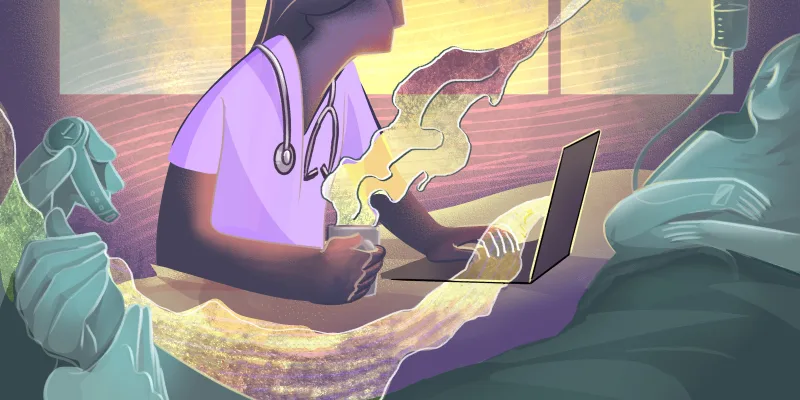I was the first of my family to go to medical school. Growing up, I knew very little about the details of doctoring and the medical system. I simply thought of doctors as all-knowing healers. When I first started to be in hospitals, I was surprised to realize that next to patient care, doctors actually spend most of their time managing teams, completing administrative tasks, and teaching the next generation of clinicians. Why is it that how to be a manager, administrator, or an educator never came up once during medical school?
As I pulled all-nighters studying for multiple choice exams and rotating at different clinical sites, my husband worked in consulting and ran start-ups and a small business. Dinner table conversations in our home often focused around him thinking about how to be an effective manager. He wanted his coworkers to be motivated, excited, and supported. From planning retreats to soliciting frequent feedback, I watched him care tremendously about optimizing the culture at work to inspire both productivity and joy.
Meanwhile, I would share my struggles of being on medical teams during medical school and residency that were disorganized and burnt out. Much of the time I was left to figure things out on my own. It seemed taboo to ask for help or for clear expectations and guidelines. Having a different attending, resident, or co-intern day-to-day was to be expected. I could not keep up with deciphering differences in personality and clinical practice. It became clear to me that bad management was at the root of many negative experiences, and the usual outcome was poor patient care and missed learning opportunities. I envied the frequent one-on-one and team-based professional development conversations my friends outside of medicine were having at their jobs. I never heard my coworkers even think about themselves as managers.
I've since been on a journey to learn from other industries about how to manage teams. One of my favorite practices I've come across is to create an "operating manual" and give it to new team members in advance of our first day together. It's essentially a guide of "how" to best work with me (what do you need to know about my expectations and needs) as well as "why" (my philosophy of care). They still have to rapidly adapt to a new attending's personality, but at least they have a guide that eliminates some of the guesswork so they can instead focus on doctoring.
In my operating manual, I have five pillars: Communication, Compassion, Learning, Wellness, and Efficiency. As an example, my Communication section contains these tenets:
COMMUNICATION
- You can ask me or talk to me about anything at any time. In medical school, I always wondered, “Is this a good time to speak?” or “Is it OK for me to ask about this?” I never want you to worry about those things! Ask me whatever, whenever.
- I’m always available to debrief about a challenging patient or practitioner interaction.
- I want to support you in making your own clinical decisions, but please always call or page if something doesn’t feel right or if you have any questions.
- I will provide day-to-day informal feedback as well as formal feedback at the end of the rotation. I urge you to do the same! Feedback is the best way to learn and improve.
Each of these bullets essentially say "I am available to talk to any time," and also outline my philosophy of team culture: I am letting the new team member know that questions are encouraged, that they may not always have positive interactions with their colleagues or patients (and that's OK), and that I'm here to support them in their growth.
In order to share my philosophy of patient care, and to give you an idea about how you might share yours, my Compassion section looks like this:
COMPASSION
- When you are in a patient’s room, sit down, even if you are only there for a few minutes. This helps make the patient feel more at ease and shows them that you are present.
- When talking about patient histories, say the word “concern” instead of the word “complaint.” We don’t want to sound like patients are complainers for having medical issues.
- Remember that the most challenging patients are often those most in need of our help.
- Update, update, update patients and their families regularly. It’s one of our most important responsibilities as house staff. Whenever a patient is being transported to a procedure or a test they should know exactly where they are going and why.
A big part of managing is role modeling behavior. Each of these bullets highlights how I think it’s important to make patients the center of our caregiving. I find it helpful to provide new team members clear and concrete advice on how to connect with patients and their families.
My manual has been the catalyst for creating long-term mentoring relationships with a number of medical students, interns, and residents. I even received a hand calligraphed note and a cartoon drawing of my face. Sadly, though, I’ve yet to see anyone else make this kind of manual. What I wish is that creating these kinds of guides, and more global discussions around successful management, would become commonplace within medicine. Right now, a student or resident considers themselves tremendously lucky when they have a supervisor who has strong management skills. This should not be based on luck. This should be the expectation. We should not just be managers, educators, and administrators because we have to, but because we want to. I hope these skills can be developed and celebrated, and I hope to see at least others in medicine have an operating manual.
What tips do you have about how to be a better doctor and manager? What would you put in your operating manual? Share your strategies in the comments.
Charlotte Grinberg is an oncology hospitalist at Beth Israel Hospital in Boston, MA. She has a particular interest in palliative care and narrative writing. Her writing has appeared in JAMA, Health Affairs, and the Annals of Internal Medicine. She is a 2020–2021 Doximity Op-Med Fellow.







